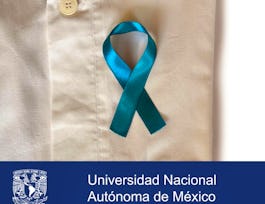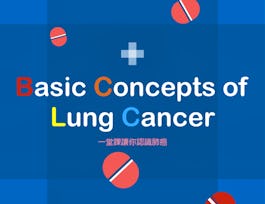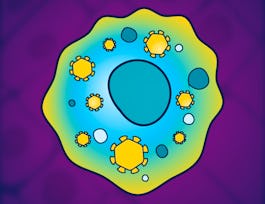Over 500,000 people in the United States and over 8 million people worldwide are dying every year from cancer. As people live longer, the incidence of cancer is rising worldwide and the disease is expected to strike over 20 million people annually by 2030. This open course is designed for people who would like to develop an understanding of cancer and how it is prevented, diagnosed, and treated.



Introduction to the Biology of Cancer
This course is part of Cancer Biology Specialization

Instructor: Kenneth J. Pienta, M.D.
Sponsored by Coursera for Reliance Family
208,861 already enrolled
(7,534 reviews)
Skills you'll gain
- Science and Research
- Health Care
- Case Management
- Patient Treatment
- Medical Science and Research
- Nursing and Patient Care
- General Medical Tests and Procedures
- Nursing
- Epidemiology
- Nursing Care
- General Science and Research
- Life Sciences
- Direct Patient Care
- Radiology
- General Medicine
- Nursing Process
- Clinical Trials
- Biostatistics
- Clinical Nursing
- Treatment Planning
Details to know

Add to your LinkedIn profile
7 assignments
See how employees at top companies are mastering in-demand skills

Build your subject-matter expertise
- Learn new concepts from industry experts
- Gain a foundational understanding of a subject or tool
- Develop job-relevant skills with hands-on projects
- Earn a shareable career certificate


Earn a career certificate
Add this credential to your LinkedIn profile, resume, or CV
Share it on social media and in your performance review

There are 6 modules in this course
In this first week, we'll get a high-level introduction to the basics of cancer biology as well as incidence and common types of cancer.
What's included
5 videos4 readings1 assignment
Now, we'll turn our attention to the genetics of cancer, variation and mutation, two-hit hypothesis, and genomic instability.
What's included
4 videos1 assignment
All cancers share ten cellular hallmarks. This week, you'll learn to identify these hallmarks in order to distinguish a normal cell from a cancerous cell.
What's included
4 videos1 assignment
The lethal agent of cancer is metastasis. This week, we'll take a good look at this deadly event, TNM staging, the metastatic process, and an ecological paradigm.
What's included
5 videos1 assignment
This week, we'll examine imaging as a tool for diagnosis, staging, and treatment of cancer.
What's included
5 videos1 assignment
In this final week, we'll examine the variety of treatment options available to doctors and patients as well as the features of clinical trials and how they are used to improve the treatment arsenal.
What's included
9 videos1 reading2 assignments
Instructor

Offered by
Why people choose Coursera for their career




Learner reviews
7,534 reviews
- 5 stars
84.84%
- 4 stars
13.08%
- 3 stars
1.63%
- 2 stars
0.21%
- 1 star
0.22%
Showing 3 of 7534
Reviewed on Aug 15, 2019
Course is concise and professors are well learned in their fields. Information in the course is relatively well dispersed. Use of diagrams is good and makes it easy to remember the content
Reviewed on Jun 5, 2020
It was a course of much interest. Everything is explained very simply. I have learned lot of important information. I am delighted to be able to do this online course at JOHNS HOPIKNS university.
Reviewed on Sep 12, 2017
Thoroughly enjoyable course that covered some of the molecular biology and pharmacological management of cancer. Definitely gave me a heads up for my pathophysiology studies next semester!
Recommended if you're interested in Health

Universidad Nacional Autónoma de México

National Taiwan University

Imperial College London

Johns Hopkins University

Open new doors with Coursera Plus
Unlimited access to 10,000+ world-class courses, hands-on projects, and job-ready certificate programs - all included in your subscription
Advance your career with an online degree
Earn a degree from world-class universities - 100% online
Join over 3,400 global companies that choose Coursera for Business
Upskill your employees to excel in the digital economy


